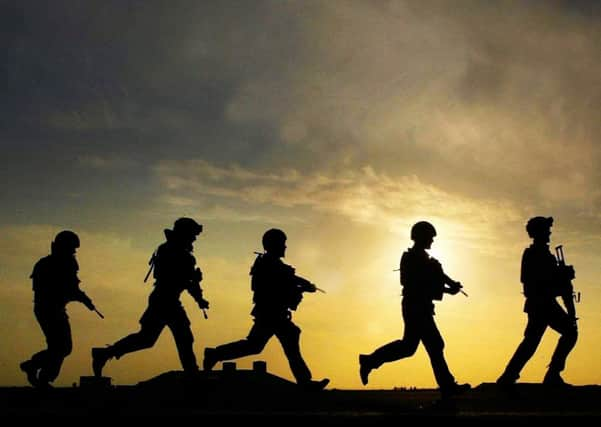How soldiers struggle away from the frontline


Sean is typical of the veterans who walk through the doors of Home Straight.
He grew up wanting to join the military and saw his dream realised, serving as a Royal Marine in both Iraq and Afghanistan. What he wasn’t prepared for was the long-term impact of life on the frontline.
Advertisement
Hide AdAdvertisement
Hide AdBack home, suffering from post traumatic stress, relationships with friends and family became strained and he found it impossible to hold down a job. As money began to run out, he spent the last few pounds he had on a survival kit and went to sleep on the streets.
“Between 2010 and 2013 there was a 37 per cent rise in the number of homeless in the UK and one in 10 of those are veterans,” says Andrew Cook, head of fundraising at Walking with the Wounded, which is targeting its Christmas campaign at raising money for its Home Straight programme. “Soldiers who have left the Armed Forces having returned from Iraq and Afghanistan are much better supported than those who came out 20 or 30 years ago having served in the Falklands and Bosnia.
“Part of the aim of Home Straight is to find those people who have slipped through the net, but it is incredibly difficult. These are guys who know how to live out of a backpack. We are not talking about blokes sat on a park bench drinking Special Brew. They know how to keep clean and look smart with very little and because of that most of the people they come into contact with would never even guess they are homeless.
“However, what we do know is that many of them gravitate back to the area where they trained. For some of them it’s the closest thing to home, which is why we have based the project near to existing bases.”
Advertisement
Hide AdAdvertisement
Hide AdThere are currently four Home Straight programmes up and running, including one at Catterick in North Yorkshire. It was only launched in June, but in the first six months it has already helped 44 veterans.
“The homeless shelter we run can take up to 31 people for 18 months at a time,” says Lesley Swales, specialist support worker in education, employment and training at The Beacon, which delivers the Home Straight programme in Catterick. “Once they are on their feet it is my job try to rebuild their self-esteem and support them in finding a new career.
“When all you have ever wanted to do is be a soldier that’s not easy and it is particularly difficult for those who have been wounded. They feel powerless and we have to find a way to work through that.”
In recognition of the number of homeless veterans, Walking with the Wounded is asking people to ditch the car, train or bus between now and Boxing Day and make just one journey by foot instead. Registration costs £15 and while some brave souls have elected to walk from Edinburgh to Newcastle and London to Cheshire, any distance will do.
Advertisement
Hide AdAdvertisement
Hide AdAll proceeds will go towards the Home Straight projects, which receive no Government funding and which cost £40,000 to set up. Thanks to Home Straight, Sean did eventually find help. Working with Lesley and others he now not only understands how PTS affects individuals, but also how best to manage his own symptoms. He is now living in his own home and has successfully found work as a dog handler.
“When we are applying for funding we often have to write case studies about the people we help,” says Lesley. “They can make very bleak reading and I will often say to our clients, ‘I don’t want you to read this’. My job is to focus on the positives, but as one soldier said to me, ‘It might be grim to read, but it was worse to live through it’.”
To be a part of Walking Home For Christmas visit www.walkingwiththewounded.org.uk